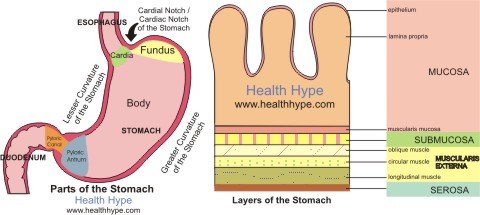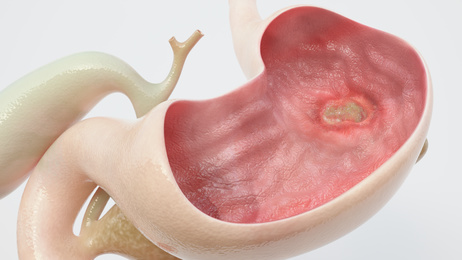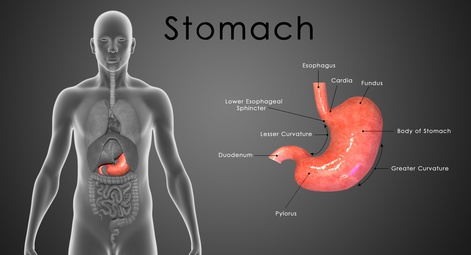Stomach Polyps (Growths) Causes, Symptoms, Treatment
Abnormal growths can occur anywhere in the body. There are various types of growth but one of the common types is a polyp. This growth can occur in any cavity of the body. When it occurs in the nasal cavity then it is known as a nasal polyp. When it occurs in the colon then it is known as a colonic polyp. Similarly these protruding growths can occur in the stomach.
What is a stomach polyp?
A stomach polyp or gastric polyp is a mass or growth in the layers of the stomach that protrudes above the surface of the surrounding mucosa (stomach lining). Most stomach polyps are benign meaning that it is non-cancerous. However, a stomach polyp has the potential to become cancerous (malignant). Overall, a stomach polyp is a rare condition when compared to other gastric conditions like gastritis and peptic ulcers.
Apart from the risk of cancer, these polyps can also cause an obstruction within the stomach. It can hamper the entrance of food, the digestion process within the stomach or the exit of partially digested food (chyme) into the small intestine. However, in most cases these growths in the stomach do not cause any problem and there are often no signs of symptoms.
Size of Stomach Polyps
Most stomach polyps are less than 1 centimeter in diameter and due to inflammation or hyperplasia (explained below). These smaller polyps are usually not of concern as they tend not to be cancerous. Larger stomach polyps, greater than 1.5 centimeters in diameter, are associated with a greater risk of malignancy (cancer) and if the polyp is larger than 2 centimeters in diameter, it is usually removed immediately.
Types of Stomach Polyps
There are three main types of stomach polyps – hypertrophic, fundic and adenomas.
Hypertrophic Polyps
Most stomach polyps occur due to inflammation or hyperplasia of the epithelium or deeper layers. Overgrowth of tissue (hyperplasia) in the stomach lining occur as a result of repeated inflammation. There are usually multiple hypertrophic polyps present simultaneously which appear oval in shape with a smooth surface.
Sometimes the polyp is ulcerated, similar to a peptic ulcer, although this is usually superficial. Microscopic examination of the polyp reveals significant edema (swelling) in the lamnia propria layer and it is not uncommon for the mucosa around the polyp to also be inflamed.
Fundic Gland Polyps
Also known as fundic cystic gland polyps, these stomach polyps arise as a result of a cyst-like dilation of the glandular tissue of the stomach lining. The growth is typically lined by flattened parietal and chief cells, which are the cells that are responsible for the stomach enzymes and stomach acid. The tissue of the polyp as well as the surrounding tissue are usually not swollen and inflamed.
Gastric Adenomas
Adenomas are a less common type of gastric polyp (10% of cases) and is most commonly found in the antrum of the stomach. These types of polyps are composed of abnormal intestinal-type columnar epithelium. The level of dysplasia of these cells may be low or high grade. Adenomas are the most likely type of stomach polyp to become cancerous. The risk of malignancy is linked to its size – polyps larger than 2 centimeters in diameter are of a higher risk.
Causes of Stomach Polyps
Any condition that causes chronic inflammation of the stomach wall can cause gastric polyps. Most of the time these polyps are associated with chronic cases of the two common conditions of the stomach, gastritis and peptic ulcers. Some types of polyps can occur due to genetics and sometimes there is no clearly identifiable cause.
Hypertrophic Polyp
The most common cause of stomach polyps is chronic gastritis. Persistent irritation of the stomach lining triggers excessive growth of normal cells (hyperplasia). If the gastritis is a result of long term H.pylori infection, successful eradication and appropriate treatment of H.pylori gastritis may lead to the polyp resolving spontaneously. Most cases of gastritis that lead to a polyp formation will result in a hypertrophic polyp.
Fundic Gland Polyps
This is often linked to an inherited condition known as familial adenomatous polyposis (FAP). However the rise in fundic gland polyps in recent years may be linked to long term use of proton pump inhibitors which may result in increased gastrin secretion and hyperplasia of the glandular tissue.
Adenomas
An adenoma is more likely to occur in cases of chronic H.pylori gastritis or autoimmune gastritis that progress to atrophic gastritis (destruction of the stomach lining as a result of chronic inflammation). A family history of familial adenomatous polyposis (FAP) also increases the incidence of an adenoma.
Signs and Symptoms
Most stomach polyps are silent (asymptomatic) and are routinely found upon conducting an upper GI endoscopy. When symptomatic, it may cause abdominal pain, nausea and vomiting or gastric bleeding. These symptoms are non-specific and may occur with various other digestive diseases. Therefore diagnostic investigations are necessary to confirm a diagnosis of stomach polyps.
Although a rare gastric condition, stomach polyps should be considered as a possible complication in chronic gastritis. The signs and symptoms often associated with stomach polyps is usually due to the gastritis and not as a result of the polyp itself. In the event of an ulceration of the polyp, the symptoms may also resemble a stomach ulcer. Larger stomach polyps may result in a gastric outlet obstruction where the movement of partially digested food is impeded by the polyp.
Treatment of Polyps
Treatment may not be necessary for small polyps that are not causing any symptoms. However, larger polyps may need to be surgically removed. Adenomas of any size as well as polyps associated with a hereditary condition known as familial adenomatous polyposis should be removed as it has the potential to become cancerous. Polyp removal is usually done endoscopically.
Apart from surgery to remove the polyps, other forms of treatment may be required to treat the underlying cause. For example, common inflammatory conditions of the stomach like gastritis and peptic ulcers may be treated with antibiotics if caused by Helicobacter pylori (H.pylori infection) and proton pump inhibitors (PPIs). This treatment can allow the polyp to resolve on its own, depending on the type of polyp, and prevent recurrence in the future.








